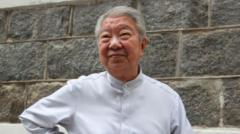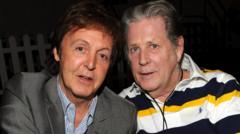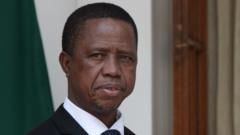**The sudden death of Pope Francis has sparked grief around the world as global leaders hail his contributions to social justice and climate activism while raising questions about the future direction of the Church.**
**Pope Francis Passes Away: A Legacy of Inclusion and Global Outreach**

**Pope Francis Passes Away: A Legacy of Inclusion and Global Outreach**
**In a pivotal moment for the Catholic Church and its followers, Pope Francis has passed away at the age of 88, leaving behind a legacy characterized by inclusivity and compassion for the marginalized.**
---
Vatican City - Tragically, Pope Francis has died at 7:35 a.m. on April 21, 2025, as confirmed by Cardinal Kevin Farrell, the Vatican’s de facto administrator following the pope's passing. Thousands quickly assembled in St. Peter’s Square, recalling the pope’s recent presence just a day prior when he blessed the faithful during Easter celebrations.
Concerned citizens and leaders around the globe have expressed their sorrow, underscoring the Pope's commitment to supporting the marginalized and the disadvantaged. His significant accomplishments included addressing the sexual abuse crisis within the church and promoting climate change awareness. Francis' legacy is now under scrutiny as cardinals prepare to elect his successor—a crucial choice between continuing his path of inclusivity or reverting to more traditional doctrines.
Francis—whose real name was Jorge Mario Bergoglio—was the first Jesuit pope and the first from Latin America, having been born in Buenos Aires. He championed social justice, prioritizing bonds with the poor and advocating for refugees and migrants throughout his devastatingly impactful papacy that began in 2013.
Despite his health struggles, including a near-fatal bout of pneumonia earlier this year, he continued to engage actively with the public, meeting leaders and blessing congregants until the very end. In his last address, Francis called for peace in conflict zones, emphasizing compassion for the vulnerable, a message that resonated with millions worldwide.
As tributes flowed in from numerous global leaders, including French President Emmanuel Macron and Italian Prime Minister Giorgia Meloni, they recognized Francis' deep concern for the least among us. Meanwhile, the future of the Catholic Church hangs in the balance, with ongoing debates about the church's direction as cardinals prepare for the election of the next pope.
The funeral arrangements are set to begin, following centuries-old customs that allow for public mourning and reflection. As the bells of St. Peter’s Basilica toll, marking each year of the late pope’s life, the Catholic community finds itself in a time of both profound sorrow and critical reflection on the path ahead, questioning whether the values instilled by Francis will endure in future leadership.
In conclusion, Pope Francis' departure leaves an undeniable void not only in the Catholic Church but in the global discourse of compassionate leadership, leaving history to reflect on his enduring commitment to inclusiveness and social justice.
Vatican City - Tragically, Pope Francis has died at 7:35 a.m. on April 21, 2025, as confirmed by Cardinal Kevin Farrell, the Vatican’s de facto administrator following the pope's passing. Thousands quickly assembled in St. Peter’s Square, recalling the pope’s recent presence just a day prior when he blessed the faithful during Easter celebrations.
Concerned citizens and leaders around the globe have expressed their sorrow, underscoring the Pope's commitment to supporting the marginalized and the disadvantaged. His significant accomplishments included addressing the sexual abuse crisis within the church and promoting climate change awareness. Francis' legacy is now under scrutiny as cardinals prepare to elect his successor—a crucial choice between continuing his path of inclusivity or reverting to more traditional doctrines.
Francis—whose real name was Jorge Mario Bergoglio—was the first Jesuit pope and the first from Latin America, having been born in Buenos Aires. He championed social justice, prioritizing bonds with the poor and advocating for refugees and migrants throughout his devastatingly impactful papacy that began in 2013.
Despite his health struggles, including a near-fatal bout of pneumonia earlier this year, he continued to engage actively with the public, meeting leaders and blessing congregants until the very end. In his last address, Francis called for peace in conflict zones, emphasizing compassion for the vulnerable, a message that resonated with millions worldwide.
As tributes flowed in from numerous global leaders, including French President Emmanuel Macron and Italian Prime Minister Giorgia Meloni, they recognized Francis' deep concern for the least among us. Meanwhile, the future of the Catholic Church hangs in the balance, with ongoing debates about the church's direction as cardinals prepare for the election of the next pope.
The funeral arrangements are set to begin, following centuries-old customs that allow for public mourning and reflection. As the bells of St. Peter’s Basilica toll, marking each year of the late pope’s life, the Catholic community finds itself in a time of both profound sorrow and critical reflection on the path ahead, questioning whether the values instilled by Francis will endure in future leadership.
In conclusion, Pope Francis' departure leaves an undeniable void not only in the Catholic Church but in the global discourse of compassionate leadership, leaving history to reflect on his enduring commitment to inclusiveness and social justice.




















